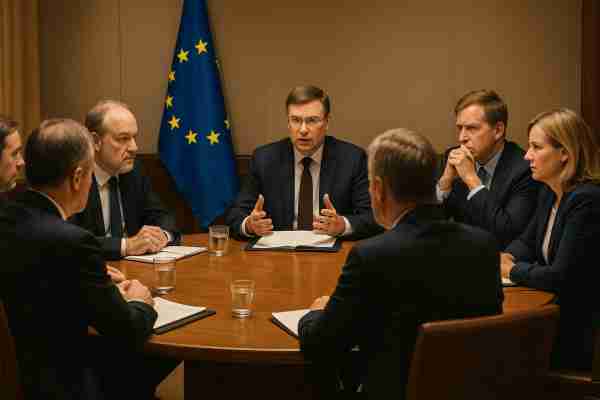When René Duval, France's Minister of Trade, entered the meeting room of the European Commission in Brussels, there wasn't a trace of doubt on his face. He knew this meeting wasn’t just another bureaucratic gathering. It was the beginning of something big. In less than three weeks, the US was about to impose a 30% tariff on European goods, and the EU stood at a crossroads: to yield or to resist. Around the oval table sat representatives from Germany, Italy, Spain, Poland, and the Scandinavian countries. The air was thick with the smell of strong coffee and tension. Each minister understood—any hesitation would be perceived as weakness. “We cannot afford to play defense,” said René, looking directly at his German counterpart. “If we don’t respond, our producers will suffer. French winemakers are already in panic.” Germany’s Minister of Trade, Friedrich Lang, nervously tapped his fingers on the table. “Our auto industry is target number one for Washington. But if we respond too harshly, we risk dragging the entire continent into an economic war.” The session chair, EU Trade Commissioner Valdis Dombrovskis, waited for a pause, then spoke: “The EU must speak with one voice. We have three weeks. Either we achieve the withdrawal of tariffs through diplomacy, or we prepare reciprocal measures. I propose postponing our tariffs until August 1, but launching intensive negotiations.” The decision wasn’t easy, but it was made. The meeting lasted late into the evening. Reports were heard from the most vulnerable sectors—Irish pharmaceuticals, Italian wine, Czech engineering. The next morning, European newspapers carried headlines: “EU Prepares for Trade Storm,” “Brussels Unites Against Trump,” “Three-Week Window of Opportunity.” Meanwhile, at BMW’s Munich headquarters, analysts were calculating losses if tariffs came into effect. In Bordeaux, winemakers staged protests. In Dublin, Pfizer halted its plant expansion investments. But work in Brussels continued. A special task force was created. A series of urgent visits began—to Washington, Ottawa, Tokyo. On July 17, an emergency session of the European Parliament was scheduled to approve a strategic support package for European exports, including compensation and subsidies. Whispers in the corridors said: “Trump wants to break the EU through economics.” But in reality, the opposite was happening—under external pressure, Europe began to unite. The story of the meeting became more than just news. It turned into a chronicle of an era, where every diplomat, every statement, and every tariff was part of a grand chess game whose outcome would determine not only the economy but the political future of the continent.
Tariff Conspiracy: A Brussels Chronicle

Published : 14.07.2025
